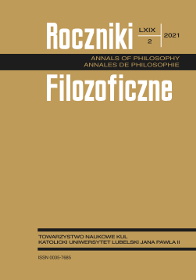What Kind of Reasoning Is, according to Aristotle, the Argument by Example (Paradeigma)?
Abstract
The paradigm (example) is an inductive argument in rhetoric. However, the paradigm is not about moving from many specific cases to a certain generalization, i.e. universalization of all individual cases — as it normally happens in inductive argumentation. Instead, it is rather a transition from one detail to another similar one; with the condition being that both specific cases belong to the same type. Therefore, the paradigm is not an induction in the strict sense, but it seems more to meet the conditions of analogy. The article formulates the thesis that Aristotle distinguishes three types of inference: deduction, induction and analogy. In order to demonstrate the specific nature of inference by the paradigm, which seems to be a type of analogy, other types of inferences are also examined, i.e. apodeictic, dialectical, and inductive syllogisms.
The article is an attempt to present the characteristics of argumentation by paradigm and show its specific nature in the light of Aristotle’s Rhetoric and his logical writings: Prior Analytics, Posterior Analytics, Topics, and Sophistical Refutations.
References
Achmanow, Aleksander. 1965. Logika Arystotelesa. Przeł. Andrzej Zabłudowski i Barbara Stanosz. Warszawa: PWN, 1965.
Aubenque, Pierre. 2010. „Powstanie pseudo-Arystotelesowskiej teorii analogii bytu”. Przeł. Tomasz Bartel, Jan Bigaj, Seweryn Blandzi, Danilo Facca. Archiwum Historii Filozofii i Myśli Społecznej 55: 293–306.
Bartha, Paul. 2019. „Analogy and Analogical Reasoning”. The Stanford Encyclopedia of Philosophy (Spring 2019 Edition), red. Edward N. Zalta. Dostęp 24.04.2020. https://plato.stanford.edu/archives/spr2019/entries/reasoning-analogy/.
Biegański, Władysław. 1909. Wnioskowanie z analogii. Lwów: Wydawnictwo Polskiego Towarzystwa Filozoficznego.
Grimaldi, William M.A. 1972. Studies in the Philosophy of Aristotle’s Rhetoric. „Hermes” Einzelschrift 25. Wiesbaden: Franz Steiner Verlag.
Groarke, Louis. 2009. An Aristotelian Account of Induction. Creating Something from Nothing. Montreal: McGill — Queen’s University Press.
Hacking, Ian. 2013. „What Logic Did to Rhetoric”. Journal of Cognition and Culture 13, no. 5: 419–436.
Kwiatkowski, Tadeusz. 1969. Poznanie naukowe u Arystotelesa. Warszawa: PWN, 1969.
Lechniak, Marek, i Andrzej Stefańczyk. 2019. „Argumentation Strategies in Aristotle’s Theory of Rhetoric: The Apparent Enthymeme and the Refutative Enthymeme”. Studia Semiotyczne — English Supplement 30: 129–150.
Mortimer, Halina. Logika indukcji. Warszawa: PWN, 1982.
Rapp, Christof. „Aristotle’s Rhetoric”. The Stanford Encyclopedia of Philosophy (Spring 2010 Edition), red. Edward N. Zalta. Dostęp 24.04.2020. https://plato.stanford.edu/archives/spr2010/entries/aristotle-rhetoric/.
de Rijk, L[ambertus] M[arie]. 2002. Aristotle: Semantics and Ontology. Vol.1. Leiden, Boston, Köln: Brill.
Ross, William David. 1959. Aristotle. New York: Meridian Books, 1959.
Skwara, Marek. 1994. „O Arystotelesowskiej teorii dowodzenia retorycznego”. Pamiętnik Literacki 84, nr 4: 130–152.
Sprute, Jürgen. 1982. Die Enthymemtheorie der aristotelischen Rhetorik. Göttingen: Vandenhoeck & Ruprecht.
Stefańczyk, Andrzej. 2000. „Pisteis w argumentacji retorycznej u Arystotelesa”. Roczniki Humanistyczne 48, z. 3: 21–32.
Stefańczyk, Andrzej. 1996. „Teoretyczne założenia ‘Retoryki’ Arystotelesa”. W: Retoryka antyczna i jej dziedzictwo, red. Jerzy Axer, 35–49. Warszawa: Polskie Towarzystwo. Filologiczne.
Ueberweg, Friedrich. 1865. System der Logik und Geschichte der logischen Lehren. Bonn: de Gruyter 1865.
Copyright (c) 2021 Roczniki Filozoficzne

This work is licensed under a Creative Commons Attribution-NonCommercial-NoDerivatives 4.0 International License.





